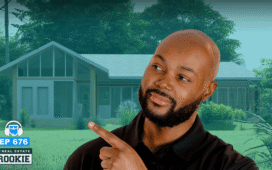Have zero experience in real estate investing (literally no idea where to begin)? This guest proves you could be financially free in ten years or less if you start today.
Just a decade ago, Peter Fife was broke, working a dead-end job, and never thought about investment properties. He had such little money that when a book on investing piqued his interest, he would sit in a bookshop reading it, but never buying it. His brother, who had some money but bad credit, asked Peter to use his credit to fund a renovation on a triplex. Both had no idea what they were getting into—essentially a second job after their nine-to-fives, painting, replacing floors, scrubbing walls.
The profit from the first deal? Close to a six-figure check, replacing Peter’s income. He then did his spin on the BRRRR method—buying, renovating, reinvesting, and repeating—quitting his job with just two properties.
Now, less than a decade later, he’s financially free with enough passive income to support him and his wife. He took some huge risks, including selling everything he worked for to buy one really run-down property. The gamble worked out, and he’s still using the same formula today!
Dave:
This investor went from buying a single property to owning multiple apartment complexes and cashflowing $7,000 per month, all in less than 10 years. Peter was working a dead end job in 2018 when his brother suggested fixing up a house that was about to get foreclosed on. A year later, they each made nearly six figures. And then Peter was hooked on real estate investing and was willing to do whatever it took to build a profitable portfolio, including sleeping in his truck for several weeks while renovating a new property. That dedication has paid off with nearly a three x return and a repeatable new investing formula. Let’s hear exactly how Peter makes these deals work.
Dave:
Hey everyone. I’m Dave Meyer, head of Real Estate Investing at BiggerPockets, and on this show, we teach you how to achieve financial freedom through real estate. Our guest on the show today is Peter Fife from Provo, Utah. Peter started investing with just a single triplex and cold-called more than 20 lenders to find funding for that first deal. Today, he’s able to clear million dollars on some individual deals. He scaled up by getting creative and hustling to make deals work that other people overlooked, enduring a lot of short-term discomfort to achieve long-term success. Peter did all this by going all in. He burned the boats, and it’s not for everyone, but this is a super inspirational real estate journey that’s only getting better. Let’s bring on Peter. Peter, welcome to the BiggerPockets podcast. Thanks for being here.
Peter:
Oh, thanks for having me. I’m excited.
Dave:
Yeah, this is going to be a great show. Let’s start by hearing your background. Who are you? Where do you live, and how’d you get into real estate?
Peter:
I lived in Manta, Utah, farm town. Not a lot of access to real estate, not a lot of stories there, but I started out in real estate because I was kind of at a job that I didn’t want to be at for the rest of my life and had an opportunity to kind of fall on my lap with my brother and went from there.
Dave:
And where were you at that point, both financially and professionally? Were you working? What were you doing with your time?
Peter:
I was an intern working for a company that I was staffing recruiting for them. I was happy to have the job. They eventually moved me up to a salary of making 40 or $45,000 a year. So not really a ton there either, but it was while I was at that job, my brothers actually worked there as well, that one of my brothers came to me and he had said, Hey, there’s this opportunity of a triplex in the area. I have terrible credit. You have great credit. I have money. You don’t, let’s kind of go in on this together. We’ll use your credit, my money, and we’ll see if we can flip this thing together. So that’s kind of how it got started.
Dave:
So it was a triplex in your own area. And how did he come across this?
Peter:
He was living in the same city, and I think as he was walking along, he just kept passing this triplex that was in terrible disrepair, and it turns out that the owners were kind of in the middle of a nasty divorce, and so they just needed to liquidate the property, and he happened to be there at the right time.
Dave:
What year was this?
Peter:
This was in 2017.
Dave:
Okay.
Peter:
So we walked into this triplex and the walls were brown. We thought that the owners had just painted to brown. We’re kind walking around, knocking on some walls. It’s like an old pioneer home. And after about three minutes of us faking, we knew what we were doing. We both kind of turned to each other and we were like, dude, we’re screwed.
Dave:
But you had already bought it?
Peter:
Yeah, we bought the house. We’re like, we don’t know. We’ve never even installed a toilet. We maybe painted a couple walls like, what the heck are we doing? It was crazy.
Dave:
I think that moment of panic is a ubiquitous across all real estate investors. I don’t know, people listening honestly, still have that. Sometimes when you buy something, you’re trying something a little bit new where you have that moment of panic. I want to hear how you got through that, but curious, first on just sort of the details of the deal. How much was it and how, given that you were starting one of you low credit, one of you, not a lot of money, how did you actually structure this deal and close on it?
Peter:
Yeah, so we found a local credit union that was willing to do a 10% down payment investment for an investment property. So he was able to front that with my credit. So we bought that thing for $240,000. We did all of the work ourselves, literally everything. We got it all checked by inspectors and whatnot. It was all done well, but after all was said and done, when we walked away, we sold it for $420,000.
Dave:
Wow.
Peter:
We each made a good amount of money on that one.
Dave:
And the goal was always to flip it, not to hold onto it.
Peter:
Yeah, always to flip it. And I had no idea about holding real estate properties. That was just kind of like, man, this is an opportunity to make more money than I’m making right now in my job.
Dave:
So you weren’t like, oh, I’m on the financial freedom path. Or at that point at least you’re just kind of like, yeah, making a couple grand. It sounds pretty good.
Peter:
And I do remember after closing, signing the paperwork and then I saw the money hit my bank account, and I was like, holy smokes. I just made more money on that than I will in almost two years of work.
Dave:
How painful was it though, because you had no idea what you’re doing by your own admission, was it? How steep was that learning process?
Peter:
It was brutal. So we would work our day job until four 30. We’d come home, I’d give my wife a kiss, shove down some dinner, and then he and I would be working from probably five 30 or six to midnight every night for that entire year. And his kids would come by and say hi to him. But we were working every night, so we maybe had a few days that accumulated maybe a couple of weeks throughout the year off, but we were working every night.
Dave:
How did you go about learning how to do this if you’d never done it?
Peter:
Yeah, YouTube University.
Dave:
Yeah, that’s what I figured you’d say. You just pick the project at night. You’re like, how to drywall, how to install how in toilets? Oh, yeah. Okay. There’s a wax ring under this thing. Okay, cool. Okay. What was the hardest thing?
Peter:
Rats. Oh, no, that was the nastiest thing. So yeah, we had found buckets of these rat traps that the previous occupiers. Yeah, we had to eradicate the place with rats, I think scrubbing down the walls. We thought they were brown. Turns out they’re white. They were brown because of the nicotine that had been smoked inside. Oh
Dave:
My God. Yeah, I’ve seen those kinds of houses for sure. But man, Peter, you are not doing a good job selling the idea of real estate. I mean, the check sounds good, but you’re making this sound miserable. You’re laughing though. I know it’s hard when you do it, but looking back on it, it sounds like it was worth it,
Peter:
Right? Oh, so worth it. I mean, to be honest with you, as of a couple years ago, my wife and I could have retired. Oh my God, we could have retired and maintained our standard of living. Our standard of living isn’t phenomenal, but any stretch of the imagination. But I mean, if I were to have died two years ago, my wife and kids would’ve been able to maintain their standard of living forever, which was really awesome.
Dave:
Well, that seems super motivating. I mean, you just took a huge swing right out the gate. Probably one of the hardest possible approaches to your first deal, buying it yourself, working with a partner, which is great, but neither of you really have experience in this and doing a full rehab, doing all of that DIY. But you did it and you made it work. So where’d you go from there? Were you in on rehabs or did you change your approach?
Peter:
Yeah, I was definitely in on rehabs. I kind of got that first shot of that high that I got when I walked out of that, and I was like, man, this is what I’m going to do. My brother had kind of stepped away for a bit, and so I just kind of like, okay, I’ll do this on my own. I found a property that was super cheap selling for $212,000. I thought that it would need maybe $30,000 of money into it, and I could sell it for like 320, and it was a mess. I didn’t have any money. Still.
Dave:
Can I ask what happened to the check?
Peter:
So that check went into us buying our home.
Dave:
Okay, so just quality of life, wanted to support your own living.
Peter:
And so I ended up going on Google Maps, and I typed in money and lender, and I called every lender and money result that came up. And on the 21st phone call, I got ahold of somebody, told him the deal, somehow convinced him that I could fix a house by myself in six months.
Dave:
And these were hard money lenders.
Peter:
Yeah, I guess mean this guy wasn’t necessarily hard money lender. This guy’s just money. You don’t even know.
Dave:
You still don’t even know you borrowed this person’s money. He was just like, did you just meet him behind a seven 11 and he give you a bag of money?
Peter:
I never met him. He was like, yeah, here’s my account number. Here’s my routing number, and for the expenses of the remodel, here’s my debit card. Just make sure all expenses go to the debit card.
Dave:
What I mean, I guess he’s the one taking on risk, but Wow.
Peter:
Okay. Yeah. Well, there’s a lot of risk on my side too. I said, look, if I can’t flip this in six months, then you can have my house.
Dave:
Oh, your primary. You put up your primary as collateral to a stranger on the internet.
Peter:
If this dude is willing to give me his account routing number, and the deal was going to close, let’s do it. And so he mailed me his debit card. And yeah, I worked on that house all day every day.
Dave:
I’m not going to lie. This is some shady shit now.
Peter:
I’m sorry. Hopefully this, I mean, I didn’t know what I was doing. I just needed money. So and I call and that close five months and 27 days later.
Dave:
Wow. Okay. Well, I want to compliment your hustle because that is awesome. I do respect the hustle. I know, honestly, it sounds like you really made it work. We’ll, just a word of caution. Caution to our audience, maybe don’t, not the best idea. Meet people on the internet who mail you your debit card. There are better forms of financing, let’s just say, and I had no idea there were. I didn’t know. No, I totally get it, man. I think at the beginning of my career did some stuff I would not recommend to our audience as well. In the spirit of hustle, you sometimes do something, but luckily, I think in today’s day and age, we’ve evolved this industry. There are a lot of hard money lenders. There are private money lenders. There are people that you can meet through the BiggerPockets community who maybe at least have reputation that you can check out, make sure that they have all the right paperwork in a row, that kind of thing.
Peter:
Absolutely. That’s what I did moving forward, was someone was like, Hey, you should go on BiggerPockets, check out their lenders. I was like, oh, okay. I didn’t know BiggerPockets had lenders. And so I kind of went on there, what’s a lender? Yeah, that’s kind of what it was like. And then from that point on, it was much more streamlined. I started doing several more deals and scaled up from there.
Dave:
Okay. So how did that second one, you said six months and you finished in five months and 27 days. How did that work out financially for
Peter:
You? That one I made, I think it was $42,000 on that one. Oh,
Dave:
Nice.
Peter:
Amazing. Which again, I was happy with. And I think more importantly, it gave me a good, it started giving me a good track record so that when I went to those hard money lenders, I could say, yeah, I’ve done a triplex. I’ve done this house now, and I’ve done it in the time that I’ve said I would do it at. And then they became much more willing to lend. To me,
Dave:
That’s the perfect way to do it. And you did all the work yourself again, but without your brother.
Peter:
Without my brother. So I did all of it myself, and I learned that the first go around for me, I’m guessing this is similar for everybody, but the first go around for me is arduous and slow, but then the second time around, I mean, it was easily twice as fast, so much easier.
Dave:
There’s just so many hurdles and research you have to do and mistakes, and you have to drive back and forth to Home Depot nine times in one day, and that’s just your life for a little while.
Peter:
Oh my gosh.
Dave:
And you were working full time right
Peter:
At this point? I had left my job. We were expecting our first kid, everyone thought again, thought I was nuts for leaving my job, and I did. Yeah, I was about two months away from our first baby being born.
Dave:
And was that just because you were at that point, bought in full send on real estate?
Peter:
For me, my decision came as I’ve always wanted to work for myself. I’ve seen people that are business owners, I’ve admired them, but I was terrified of starting a business, and I just thought, man, I’ve done this now a few times. This has now given me a good financial cushion. I’ll keep doing real estate while I try to start other businesses. And so that’s what I did. Every home that I flipped would translate into a business that I would try to start, which inevitably failed, and I flipped another home and I would fail that company. I failed enough to where I do have a couple of companies that are now working really well outside of real estate. That’s awesome. But there’s a graveyard of failed companies in the past.
Dave:
There’s no shame in that at all. I mean, starting businesses is really a brave thing to do. And personally, I think the best path to financial independence is owning your own businesses. And sometimes they don’t work. They’re high risk, high reward propositions. One of the reasons I love real estate is it offers a lot of the reward without a lot of the risk because sort of a proven business model. But I have also started businesses outside of real estate. Some of them have done okay, some of them have failed. That’s just the game.
Peter:
And the beautiful thing about it is that with real estate, if your business does do well, well, that money is going right back into real estate. And so that’s kind of what I’ve done. So it’s been a bit of a journey. So I’ve started a baby bottle company, which has been interesting really. And I’ve started a AI property management company, which just started, and it goes all over the place.
Dave:
Cool.
Peter:
But all that’s been funded by real estate.
Dave:
All right. Well, I want to hear how your real estate career evolved after that second flip and after you quit your job. But we got to take a quick break. We’ll be right back. They say real estate is passive income, but if you’ve spent a Sunday night buried in spreadsheets, you know better. We hear it from investors all the time, spending hours every month sorting through receipts and bank transactions, trying to guess if you’re making any money. And when tax season hits, it’s like trying to solve a Rubik’s cube blindfolded. That’s where Baseline comes in. BiggerPockets official banking platform. It tags every rent payment, add expense to the right property and schedule E category as you bank. So you get tax ready financial reports in real time, not at the end of the year. You can instantly see how each unit is performing, where you’re making money and losing money and make changes while it still counts. Head over to base lane.com/biggerpockets to start protecting your profits and get a special $100 bonus when you sign up. Thanks again to our sponsor Base Lane. Welcome back to the BiggerPockets podcast. I’m here with investor Peter Fife talking about how he quit his job right before he was having his first kid in the middle of doing a DIY flip on his second deal. Sounds like that deal worked out, but now you have your first baby, you now are full-time in real estate. Where do you go from here?
Peter:
Around the second flip, I started realizing, man, I need to start creating passive income.
Dave:
Okay.
Peter:
I’d listened to a lot of BiggerPockets. I had heard about the Bur method, and so with every flip that I did, I tried to divide the money that I made from that into two different properties, one that I would hold onto long-term, and then one that I would sell.
Dave:
I like that approach,
Peter:
And that’s kind of how I did it. So I would make $40,000. I’d find someone that would needed thousand dollars to buy the property that I’d hang on to, and then $20,000 for a down payment for the flip home.
Dave:
Okay. So you would rehab two properties essentially?
Peter:
Yes.
Dave:
You couldn’t be doing both yourself at that point
Peter:
Though, were you? No, was I was doing both myself. So it was very much like the ones that were multifamily, the duplexes, those would be the ones that I tried to buy and hang onto. They needed light remodel work, like new carpet paint, very much
Dave:
Cosmetic.
Peter:
They’re really heavy flippers. Those needed some serious work, and so I devote most of my time to those. But initially I would get this property turned around to this duplex, turned around as fast as I could so that I could get renters in there and start cash flowing.
Dave:
I mean, you must be good at this, because I bought my first deal, had that same moment where I walked in and I was like, what am I doing? I do not know how to do this. And then my experiences after that only confirmed, I don’t know what I’m doing when it comes to renovations. I’m not good at it. I am modestly handy. I could do a couple things, but I am not renovating or flipping a house by myself. So you must have either a natural ability for this or I would imagine you’ve come to like it, or how did you go from nothing to being so good at this?
Peter:
It was just the pressure of putting food on the table. I mean, kind of like what I was saying. I was taking part of that money to try to start a company that would fail, that money’s down the drain, and it’s like, shoot, I’ve got enough money to feed my family probably for the next six months. This flip has to work, and it’s only going to work the way I want it to if I’m doing it myself, which I grew out of. I started doing bigger deals and I hired, I now have a team that does all of my work for
Dave:
Me. Yeah, I mean, it sounds like you went with, I don’t know if you’ve heard of this book, there’s this book called Burn the Boats. It’s kind of like this idea that you sort of give up your plan B because then you’re all in on plan A and you put the pressure on yourself to perform. It sounds like you subscribe to that philosophy.
Peter:
Absolutely. I procrastinate until the last minute, unless I can’t procrastinate. And so for me, it’s like, well, the boat is burned. There’s no choice to procrastinate. I just have to
Dave:
Perform. So you mentioned that you now have a team. At what point and at what scale did you go from doing it yourself to hiring out some of the work?
Peter:
So I started realizing these flips are great, but they’re not giving me enough passive income that I want. And so at this point, it was very much passive income, heavy of what I wanted, and I couldn’t afford properties in Utah. Prices just spiked in the early 2020s, and so I started looking, I created a spreadsheet of 80 of the fastest growing cities in the country, and I did all this research on what the best investments would be.
Dave:
I love it. That’s my favorite pastime. That’s what I do for fun.
Peter:
It was brutal for me. This is my hobby. I hated it. I ended up hiring a VA from the Philippines, and I was like, I can’t do this, dude. I would’ve done it for you. Oh, man. What ended up happening is I found a deal of a dilapidated apartment complex in West Texas that nobody in the country wanted selling for $315,000 was a 16 unit complex.
Dave:
So you found this in West Texas. Were you just looking for deals or did you identify West Texas and then start looking for deals?
Peter:
So I had seen that Odessa and Midland, they were having some good indications that they were growing. They’re very oil dependent,
Dave:
And
Peter:
So I knew that was risky, but I had to pair that with the amount of accessible cash that I had at the time that I had. And in my experience with these lenders, it was very easy for me to get loans for deals that were one to four units. It was almost impossible for me to get deals that were five and up.
Dave:
Yep, that’s common.
Peter:
Yeah. So what I learned was that, man, if I want to break into this realm, the only way to do this is if I buy this property cash. And so I sold burning the boats. I sold all of my properties in Utah.
Dave:
Whoa.
Peter:
Bought this thing cash, and then flew down there, bought a truck for a thousand bucks, slept in the truck for a couple of weeks, fix up some units, got some tenants in there. And then at that point, I was like, this is ridiculous. I got to hire somebody. So then I found some contractors and they took over.
Dave:
Okay. Well, I really want to hear the details of this deal. It sounds like, again, you’re just going all in, hustling as hard as you can to make these deals happen. I want to hear more about it, but we got to take one more quick break. We’ll be right back. Welcome back to the BiggerPockets podcast here with Peter Fife. We just heard how he sold all of his properties in Utah, bought a multifamily in Texas, was living out of a truck, fixing it up. We got to break this thing down, man. So how much was the property in It was in Odessa, Texas
Peter:
In a suburb outside of it. Yeah.
Dave:
Okay. And how many units, how much did it cost?
Peter:
Yeah, so it was a 16 unit complex, and it costs $315,000.
Dave:
So three 15 and 16 units. That’s a little bit under $20,000 a unit. That’s pretty darn good. Okay. I can see the appeal there, but what was it like selling these properties in Utah? Was that scary?
Peter:
It was so scary because things were going well. We kind of had a system going. I was familiar with it. I thought I could repeat the process a lot of times, but at that point, my wife and I just committed to the idea of passive income. And so it was just kind of like, well, if we’re committing, then we’re burning the boats. That’s
Dave:
Just your thing, man. So what was the upside here? You’re buying it for three 15, and so when you analyze the deal, what was the arv, how much money, how much you’re going to drive up the equity value, and then since your goal has shifted to passive income, how much cashflow did you project it would give you?
Peter:
Yeah, so I ran the numbers. The units were renting out for anywhere from 850 to 1,050 per unit per door if they were renovated correctly.
Dave:
Wow.
Peter:
Yeah. The cap rates aren’t great out there, but even with those cap rates, it would sell around 1.1 to one two.
Dave:
Oh my God. Unbelievable. That’s a huge opportunity. So triple, maybe quadruple the value,
Peter:
And I kind of figured the plumbing wasn’t bad. The electrical was all up to date. It was just a lot of cosmetics. It was just a really ugly property. So I fixed up a couple of units myself to show everyone that was going to hire how it needed to be done. And then all in, we were in about $300,000 after, so three 15 for the purchase price, 300 for the renovation.
Dave:
Wow. Okay. And just to reiterate what you said before, you literally moved to Texas, bought a truck, lived out of it, and renovated some of those units.
Peter:
Yeah, so I mean, my family didn’t, I have a very patient wife.
Dave:
Oh, yeah, I, yeah, I wasn’t expecting that.
Peter:
No. I flew down to Dallas, got an Uber to some guy’s house that was selling a truck that promised me it worked. Well. He dropped me off. I gave him some money, he gave me the truck, and off I went,
Dave:
Man, you are more comfortable with internet strangers than I am. I’ll just say that. I forget it for bad, maybe. I don’t know. But thankfully, that truck worked out great. How did the deal go? How long did it take to renovate? Did you hit the rent numbers you were expecting in the rv you were expecting?
Peter:
Yeah, everything turned out the way that I had hoped. We ended up refinancing for $800,000. I was able to pull out $200,000 in equity, and then we were cash flowing around for four to $5,000 a month. Oh my
Dave:
God. Okay. So four to $5,000 a month in tax advantage money. I mean, this was years later, but you said when you first started, you were making 45 grand ish a year, so 4,000 pre-tax. And so this deal alone basically made you more income one deal, got you more income than your job had been previously.
Peter:
And then that’s not counting the $200,000 that I was able to
Dave:
Yeah. To do. Yeah. That’s unbelievable. Could you compare to, for us, how much cashflow were you making in Utah with the properties that you had to sell?
Peter:
Yeah, so the cashflow with those, I was making around maybe $2,000 a month.
Dave:
Okay, so you doubled your cashflow, added $200,000, and now you have a new truck.
Peter:
Yeah. That truck has no longer, it’s gone the way of the earth. It was not a great truck, but it was an old beater, but it was cheap and it worked,
Dave:
I would imagine for a thousand bucks to get what you pay for.
Peter:
Yeah.
Dave:
Unbelievable. Well, I think this is a really cool story. I mean, I’ll just be honest. I think a lot of people out there, Peter, are probably listening to your story and they’re like, there’s no way on earth I would do something like that. I totally respect your hustle. It’s great. It’s unbelievable. And I think for certain people out there, this is an incredible model that you can follow of just hustling and learning and betting on yourself. I think that’s what’s so cool about what you’ve done here, Peter, is just bet on yourself. But even if you’re not willing to live in a truck or do these things, I think what Peter has done here is showed a model that can really work for a lot of people. He figured out a way to make active income through flipping get large sums of money that you can use to invest, because it is hard to go after passive income if you don’t have capital. I assume you reached that understanding at a certain point, Peter, that Oh, absolutely. If you want to just buy something and hold onto it, you can’t do that for nothing. And so you need to figure out how to get enough capital upfront to make that work. Some people like me choose to do that by continuing to work full-time. Other people like Peter find ways to do that in real estate. Personally, I honestly don’t care. I think whatever is easier for you to figure out a way to make that money upfront,
Peter:
Totally,
Dave:
To invest in the long-term assets, you should go do that if your goal is long-term passive income. So I think that’s an awesome template that people can follow here. The other thing I think that is so admirable and cool about this is a lot of people buy assets and then just hold onto them forever regardless of how they’re performing. And I think it’s really cool that you sort of did the math and figured it out. And even though it might sound crazy to people to sell everything in your backyard and go move to another town, clearly you’re good at analyzing deals because you found a really good one, and the way you analyzed it turned out to be true. I mean, I assume this was sort of like a transformative life-changing deal for you that you were able to do because you were willing to think creatively and think a little bit outside the box and not just hold onto the properties that you’ve owned for years and years.
Peter:
Absolutely. And so I’ve now done that three more times. I’ve not sold any more properties, so I’ve hung on to all of the,
Dave:
So
Peter:
I did a 17 unit close by, and then I’m doing a 38 unit right now.
Dave:
Wow. In Odessa?
Peter:
No, 38 unit is in Houston. The 17 unit is in the same area of Odessa Midland.
Dave:
Why go outside of Odessa if that was working and get into another market in Houston?
Peter:
Odessa is a good place. It is dependent on oil, and so I had noticed that even with my rental trends, there were some months where I had more vacancy than I’d wanted.
Dave:
I see.
Peter:
And that wasn’t comfortable for me. And I know Houston, there’s just so many people there. If you build the right product, you’re going to find a decent amount of renters.
Dave:
For sure.
Peter:
It was safer for me.
Dave:
I just need to ask, how do you find these deals? They sound incredible.
Peter:
LoopNet, which I know sounds
Dave:
Really,
Peter:
Yeah. Yeah. These just the properties that nobody wants.
Dave:
Why
Peter:
Really? I mean, I’ve come across, so these properties are properties that have had voodoo worship in them. They’ve got tar written all over the wall, like tar splashed on the wall. You’ve got dead animals. People walk ’em, and it just scares ’em away. For me, I just see money signs. Interesting.
Dave:
Yeah, because at this point in your career, it doesn’t sound like there’s much you haven’t seen.
Peter:
No. And I mean, when you’re demoing a property, it doesn’t matter if there’s tar on the walls or not, you’re ripping off the drywall anyway. It’s just
Dave:
Slightly more stuff to throw out,
Peter:
And it’s not that big of a deal. Demo takes a few days, so it’s like a couple days of a hiccup, and it’s like that’s not that big of a deal. But for a lot of people it’s scary.
Dave:
All right. So as we sit here today, Peter, what does your portfolio look like in terms of door count, cashflow, equity, anything you’re willing to share?
Peter:
Yeah, I would say door count we’re, I think it’s at 78 right now, cashflow. We’re roughly making around seven or $8,000 a month.
Dave:
Congratulations. An unbelievable success that you’ve achieved really largely on just your own grit and hustle. Thanks. So now, Peter, that you have this passive income. What are your goals going forward?
Peter:
When I first started, I really was trying to scratch that entrepreneurial bug, but I got burned a few times with some businesses that didn’t work, and now it’s like, okay, maybe I can keep taking these gains from real estate, continue investing in real estate, but maybe I can take some time now to try to start these other businesses that I feel have a really, really promising future. But all of that’s funded by real estate.
Dave:
Awesome. Well, congratulations, Peter. It sounds like you’ve had a really interesting career and totally respect the hustle. It’s incredible what you’ve done and really taken on yourself to improve the financial lives of you and your family. Congratulations.
Peter:
Oh, thank you. Appreciate you, and this has been an awesome opportunity.
Dave:
Yeah. Thank you for being here. And thank you all so much for listening to this episode of the BiggerPockets podcast. We really appreciate it. If you have a story that you want to share on the podcast, we are always looking for guests have all experienced levels. You don’t need to be super experienced or have hundreds or dozens of units. We want to hear your real estate story. If you want to share yours, go to biggerpockets.com/guest and apply. Thanks again for listening. We’ll see you next time. I.
Help us reach new listeners on iTunes by leaving us a rating and review! It takes just 30 seconds and instructions can be found here. Thanks! We really appreciate it!
Interested in learning more about today’s sponsors or becoming a BiggerPockets partner yourself? Email [email protected].








Recent Comments